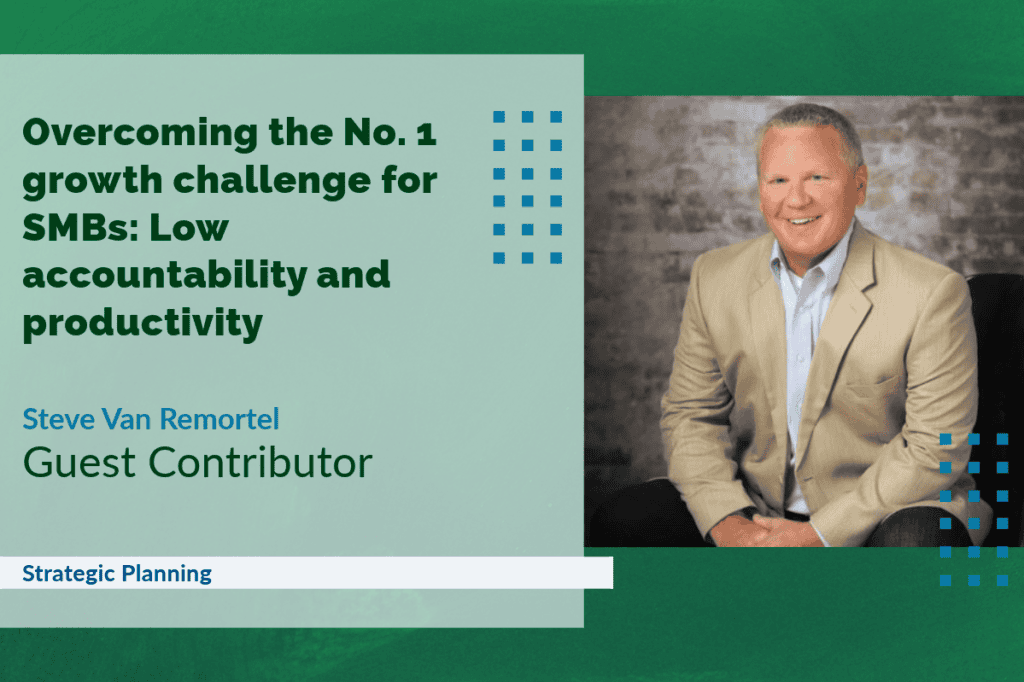
May 19, 2025
If you’re a small- or medium-sized business (SMB) leader, chances are, growth is top of mind.
But despite your drive and your team’s hard work, growth often stalls.
Why?
In a recent survey by XXX, SMB leaders pointed to the top three challenges to growth in 2025:
- Lack of accountability and productivity
- Being stuck in daily operations
- People-related issues like poor communication or hiring mistakes
Of these, one stood out as the most critical: low accountability and productivity.
It’s not just a day-to-day frustration – it’s the root cause behind slow execution, missed goals and stagnant growth.
The hidden cost of low accountability
Low accountability can show up in subtle but damaging ways.
Deadlines slip.
Roles get blurred.
Meetings result in talk, but not action.
An estimated 24 billion hours are wasted a year in unproductive meetings.
You may find yourself stepping in too often, taking on tasks you delegated – or thought you did. Over time, this adds up, and the business becomes reactive instead of strategic.
This pattern doesn’t just exhaust leaders – it stalls momentum.
Instead of scaling, you’re treading water.
Instead of leading growth, you’re managing bottlenecks.
Why it’s so hard to get accountability right
Most SMBs don’t suffer from a lack of commitment, but rather have a lack of clarity, structure and tools to drive consistent execution.
Accountability gets lost when goals are vague, expectations are assumed or communication breaks down.
Oftentimes, the challenge starts with metrics.
If you’re not measuring performance consistently, it’s hard to know what’s working – and even harder to hold people to results.
Leaders might assume everyone’s aligned, but without visible data, progress becomes subjective.
Then there’s communication.
More than 70% of the U.S. population is people-oriented.
When teams struggle to have honest, open or transparent (HOT) discussions, trust breaks down and accountability is soon to follow.
Finally, engagement plays a big role.
When employees don’t feel ownership over their work, accountability weakens.
But when they do feel empowered and supported, productivity soars.
Turning the tide: What SMBs can do now
There’s no silver bullet – but there is a proven path to build accountability and productivity into the fabric of your business.
It starts with four key shifts:
Measure what matters
If it’s not being tracked, it’s probably not being done.
Set clear performance expectations for every role.
Identify the key metrics for the company, each goal, every department and every team member who drives your business forward – and then review them regularly.
Dashboards and visual tools can help everyone stay aligned and focused.
Weekly check-ins and consistent performance conversations ensure your team stays on track and motivated.
Elevate communication with behavioral science
Accountability isn’t about micromanagement – it’s about creating an environment where team members don’t want to let each other down.
People know what’s expected, feel empowered to deliver and have the support to succeed.
Behavioral science enables teams to have those HOT conversations, because they understand each other’s working styles.
When people feel heard and understood, collaboration improves – and so does follow-through.
Leverage technology to increase accountability
Manual processes slow everything down.
Searching for files/Google Docs can be a waste of time.
Using technology to automate task reminders, track meeting outcomes and maintain visibility on what matters most can be a big help.
With AI-enabled meeting summaries and automated action plans, things rarely slip through the cracks.
Technology doesn’t replace leadership – it frees it up.
When your tech stack does the tracking, you can focus on growing your people and business.
Shift your role from firefighter to strategist
This might be the toughest change of all – but it’s the most important.
As a business leader, you must step back from the weeds.
That doesn’t mean you stop caring about the day-to-day.
It means building systems so that others can own the execution.
When your team is truly accountable, you’re free to focus on growth – on identifying new opportunities, shaping your vision and scaling with confidence.
Accountability leads to profitability
Growing the bottom line doesn’t happen just because you want it.
It happens when your business is built to execute.
Businesses that have a culture of accountability have a 48% higher operating margin than businesses that fail to execute.
That means structure, clarity and accountability – from top to bottom.
You already have the passion.
You’ve got the product/service, the team and the vision.
What’s missing is the system and cadence that make it all run smoothly.
The structure that ensures things don’t fall through the cracks.
The culture that values ownership over excuses.
The businesses that succeed aren’t the ones that work the hardest – they’re the ones that execute the best.
And accountability is the engine that drives that execution.
Those who execute the plan – profit.
 Welcome to Camp Elsewhere – a woodsy retreat
Welcome to Camp Elsewhere – a woodsy retreat Bellin’s Casey honored with WACEP Distinguished Service Award
Bellin’s Casey honored with WACEP Distinguished Service Award








